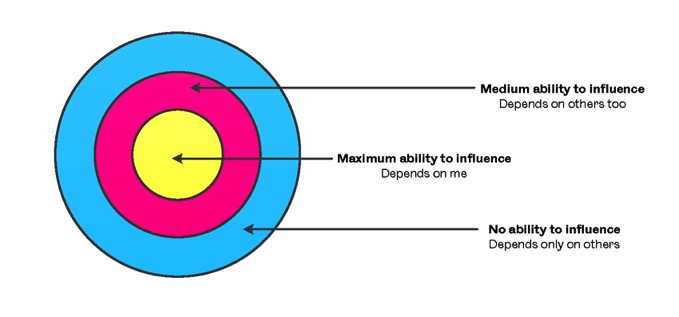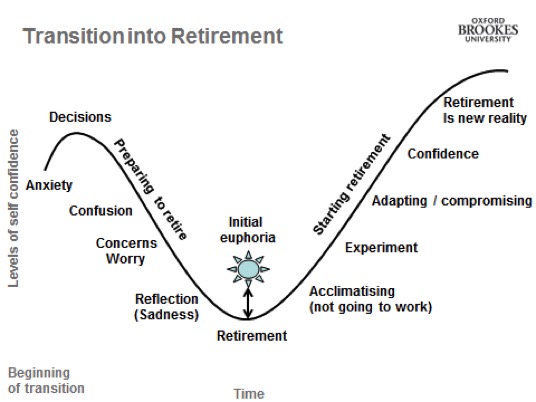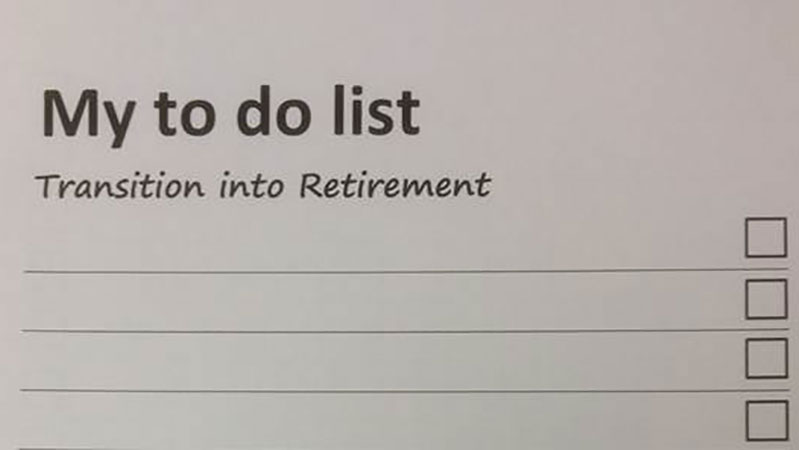To support a smooth transition into retirement, it is helpful to understand the possible stages you may experience through planning and preparing for your retirement and how to manage this period of change and transition.
Here are a few questions to get you started:
What part will you and others play in your transition into retirement?
In planning for your retirement it is important to consider what support you may need throughout the transition and beyond.
Consider and make a list of the people you would like to talk to regarding your retirement plans.
These may include your partner, family, friends, colleagues, manager, HR, independent financial adviser, citizens advice, Pension Wise adviser, etc.
Build your list as you go further through these support pages.
Can you visualise yourself in retirement?
Developing a clear vision for your retirement can support you through the change and transition process by helping you to:
- define how the future will be different from the past
- explore how to spend your retirement
- identify the decisions you need to make for your retirement
- be motivated/inspired to take the first steps and subsequent actions, to ensure your retirement plans are in place
- create the retirement you are aiming for.
Make a list of what you would like to do in retirement
Make a list of all the things you would love to do in retirement: all those things you have always wanted to do but never had the time.
For example:
- activities, hobbies and interests
- challenges and experiences
- travelling and exploring
- volunteering
- spending more time with family and/or friends
- learning and development opportunities, etc.
Talk to others
If you are finding it difficult to decide what to do in your retirement, talk to other people to see how they spend or plan to spend their time in retirement. This may be someone who is also planning their retirement, someone who has already retired or a friend or family member. You can then compare and contrast their ideas with your own vision to find what is best for you.
What do I want from my retirement and how can I influence this?
When you experience change, such as when you are planning for your retirement, it is not uncommon to feel that you have little control over the change.
The circles of influence model below (a concept taken from Stephen R. Covey’s book – The 7 Habits of Highly Effective People) is a simple and visually appealing tool that may help you to influence aspects of the change you are experiencing, and help you to feel more in control.
As you begin planning for retirement, it may be helpful to consider where you are now and what you would like to influence in preparation for your retirement, as breaking these down, may enable you to:
- See ways of beginning to manage the change
- Understand how you can begin to influence aspects of your retirement and the change process
- Identify how to overcome any barriers presented by the change.
To use the model, place the areas you would like to influence (example move nearer to the sea) into the relevant circle, depending on whether you have total control (yellow), only some control (pink) or no-control (blue).

What steps should I expect to take during my transition into retirement?
Transition is a psychological process that people go through as they come to terms with new situations, i.e. as they come to terms with a change, to support a smooth transition into retirement, it may be helpful to consider the change cycle (below), to recognise the possible stages you may experience within your transition into retirement and how to effectively manage the change.

Stage 1: Approaching Retirement
It’s very easy to become attached to the way things are, and any transition can initially be a time of fear, confusion and anxiety.
To help manage this stage in your transition:
- Create appropriate support systems
- Get the right information
- Set short-term goals
- Make plans to mark your retirement
Stage 2: Weeks Before Retirement
It is understandable to be worried and unclear about the change and to maybe feel sad about leaving for retirement. To help manage this stage in your transition:
- Draw from your support systems
- Define what is over and what isn't
- Look for the positives
- Take each day at a time (it takes time to adapt)
- Mark your retirement appropriately
Stage 3: Exploring Retirement
Once retired, those early weeks may be spent adjusting to the change but will also be your opportunity to discover how retirement can work for you. This will come from experimentation: activities; socialising; travelling, etc.
- To help manage this stage in your transition:
- Take each day at a time (it takes time to adapt)
- Draw from your support systems
- Be encouraged to try new activities
- Build momentum with "quick wins"
- Celebrate success
Stage 4: Retirement: New Beginnings
With time, you will begin to adapt to the change and become more confident in your retirement.

